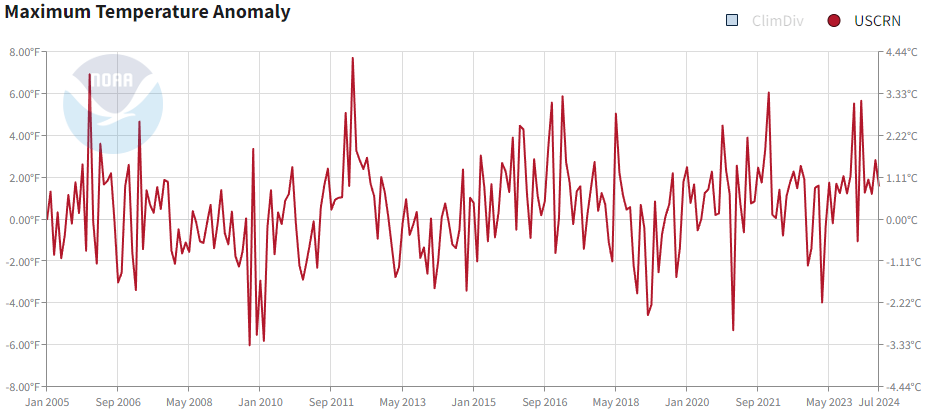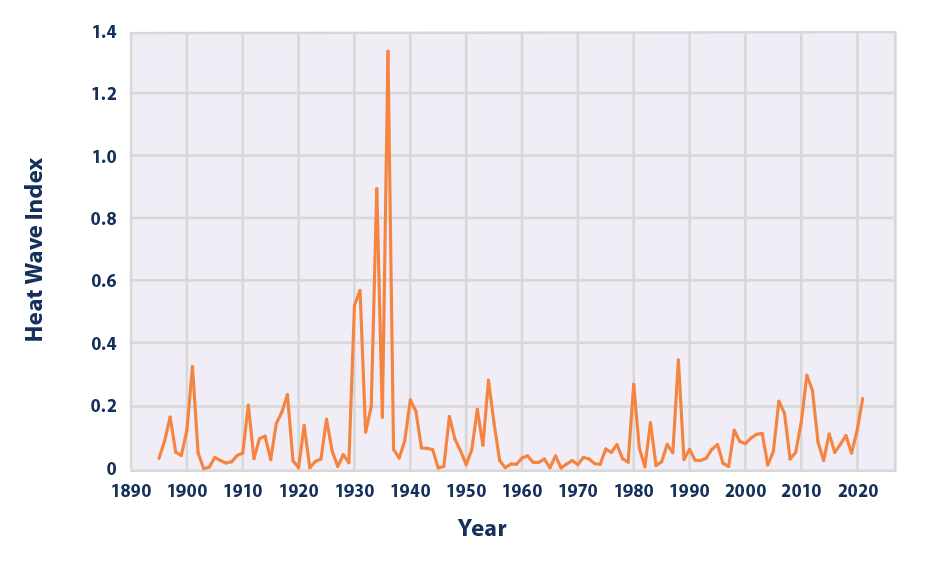Evie Magazine, a conservative-leaning women’s publication, recently posted an article titled “Climate Change Anxiety Is A Cause For The Decline In The Birth Rate,” in which the author claims that human-caused global warming is leading to climate anxiety which misdirects its wrath at larger families. This is mostly false. Climate change is not producing anxiety so much as false and misleading alarmist media coverage is, but it is true that blaming large families for bad weather is equally wrong.
The article begins with writer Carolyn Ferguson claiming that “last year was the hottest year on record for the world,” and that the United States is somehow warming faster than the rest of the world, and that “many are feeling the effects of global warming this year.” This is false.
The idea that any given country is heating up faster than the rest of the world has been done to death, and has been claimed for just about every single country on the planet. It should be obvious that every place on earth cannot be warming faster than the rest of the world. Scientists are selecting regions and comparing them independently over different timeframes, using different datasets and methods, whatever timeframe is most optimal to show the most warming. This makes these comparisons basically worthless.
The fact for the United States is that the record of high temperature anomalies, that is, extreme heat, has not shown an increase in those high temperature events since the best records begin in 2005. (See figure below)
According to longer term data, heatwaves in the U.S. today are less frequent and severe than they were in the 1930s, as seen below:
Likewise, as discussed in this Climate Realism post, the change in the number of days with temperatures over 95 degrees Fahrenheit has actually declined for the majority of the country. Only 10 U.S. states show an increasing trend.
Even looking at proxy data globally which give an idea of ancient temperatures do not indicate we are in a period that can be described as “the hottest on record.” Today’s temperatures according to some sources appear similar to that of the Medieval or Roman warm periods, roughly 1000 to 2500 years ago, respectively. Media claims to the contrary are just propaganda.
The majority of the abnormal warming from last year occurred in Antarctica, where temperatures remained well below freezing, but was simply “less cold” than normally occurred during certain months, particularly September. A significant portion of last year’s heat globally was boosted primarily due to the natural El Niño cycle, which is known to bump up average temperatures for much of the globe. This effect is easily traced in the temperature records.
This is not to say an average warming has not occurred over the past hundred-plus years, but it is not unprecedented nor is it alarming.
The Evie post proceeds to claim that aggression rises amid higher temperatures, writing “one of the most often overlooked corollaries is a rise in communal anger and aggression.”
The “heat makes people crazy” idea has been floated several times over the years, but even the article the Evie post links to admits that it’s likely heat is not the main factor in most of the studies that found aggression. The social sciences and psychology experiments are rifle with uncontrollable variables. Without attempting to conduct any studies, the plain fact that places like Florida and Mexico, the Bahamas, and other hot tropical locales are popular relaxation destinations seems to throw cold water on the hypothesis. Why would anyone go someplace that makes them angrier or more aggressive for vacation?
Discomfort can be aggravating, certainly, but it’s not just higher temperatures alone. Ferguson then gets to the claim that mental health professionals are “seeing more patients come in with symptoms of climate change anxiety, which is supposedly the root of many activists’ anger when it comes to large families.”
Climate Realism has written extensively about how misleading the climate anxiety diagnosis is, here, here, and here, for examples, often shifting the blame from the true culprits. Something like “climate anxiety” does exist – but it is a media-driven phenomenon because of the constant drumbeat of impending doom, not from actual lived experience of warming. Constant media coverage telling people that we are hurtling towards “global boiling,” that every weather extreme is because of you and your neighbor’s use of gasoline, including from typically conservative publications like Evie Magazine, is what is causing anxiety in people.
While Evie is right that climate activists should not turn their ire on big, traditional families, they are wrong that climate anxiety is a legitimate phenomenon.
As Ferguson correctly concludes in her piece, if someone decides not to have kids, “that’s their prerogative, but they should know this decision will likely have little impact on saving our planet.”






















